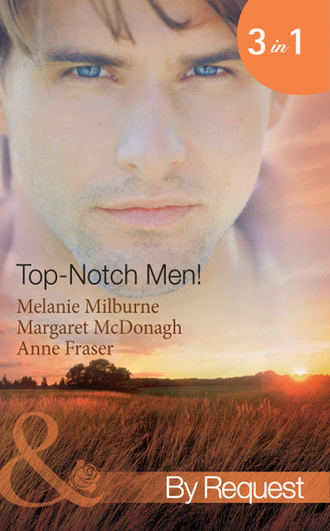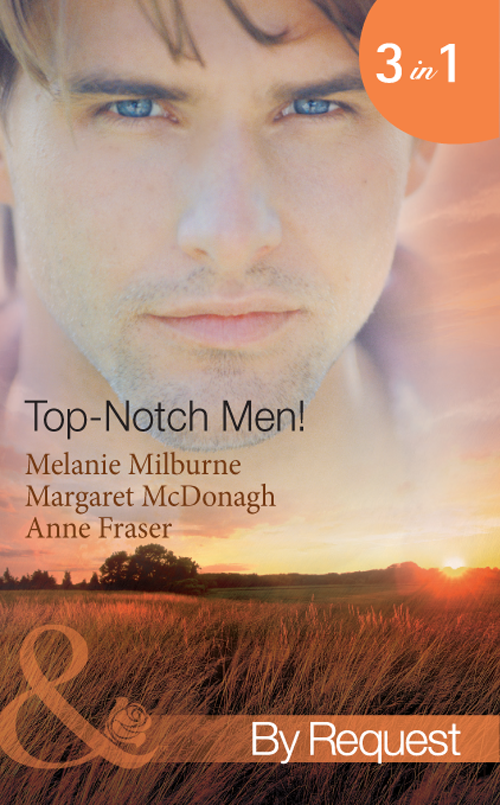
Полная версия
Top-Notch Men!: In Her Boss's Special Care


Top-Notch Men!
In Her Boss’s
Special Care
Melanie Milburne
A Doctor Worth
Waiting For
Margaret McDonagh
Dr Campbell’s
Secret Son
Anne Fraser

www.millsandboon.co.uk
Dear Reader,
One of the great privileges of being a writer is spending time with your beloved characters, talking to them, getting to know them, playing with them and then at the end of the book leaving them to get on with your own life. I guess it’s a bit like being a grandparent—at the end of the day you hand the little darlings back!
How easy would it be for people like my hero Joel and his parents to walk away from what life has dished out to them? Such a dilemma was the premise for this novel and I couldn’t think of a better heroine than Allegra Tallis, who showed such amazing compassion and hope against all odds.
However, outside of romantic literature not every story has a happy ending, and it is for this reason I dedicated this book to my three nephews and nieces, who daily deal with the human tragedy of what Joel Addison had to face.
My special thoughts and heartfelt love to all who have to do the same.
Melanie Milburne
About the Author
MELANIE MILBURNE says: “I am married to a surgeon, Steve, and have two gorgeous sons, Paul and Phil. I live in Hobart, Tasmania, where I enjoy an active life as a long-distance runner and a nationally ranked top ten Master’s swimmer. I also have a Master’s Degree in Education, but my children totally turned me off the idea of teaching! When not running or swimming I write, and when I’m not doing all of the above I’m reading. And if someone could invent a way for me to read during a four-kilometre swim I’d be even happier!”
To my nephews and niece Ben, Tommy, Peter and
Katherine (Kathy) McNamara. You have all been
through so much in your young lives and I am in awe
of how you have coped. I love each of you very dearly
and dedicate this book to you in acknowledgement of
your struggles, your tragedies and your joys that I will
always share with you, not with a glance of pity but
with the steady gaze of compassion.
I would also like to give my heartfelt thanks and
appreciation to the doctors and nursing staff of the
Royal Hobart Hospital’s Intensive Care Unit for their
invaluable help in the research conducted for this
novel, as well as Dee Nally from Salamanca Pharmacy
for her advice. Thank you all!
CHAPTER ONE
‘WHAT do you mean, he wants me to stop my research on the coma recovery assessment project?’ Allegra Tallis asked the nursing sister on duty in Intensive Care. ‘That’s outrageous. The CEO gave me his full support, I’ve got ethics approval and I’ve got funding!’
Louise Banning gave her a sympathetic look. ‘I know all that but Dr Addison is the new Director of ICTU and A and E now, and what he says goes.’
‘Not if I can help it,’ Allegra growled. ‘I’m not giving up months of research to satisfy some control freak’s demands to run a tight ship. Who does he think he is anyway? He might be the new director but if he thinks he can tell me what to—’
‘Dr Tallis?’ A deep male voice spoke from just behind her. ‘We haven’t had the opportunity to meet since I arrived. I’d like to speak to you in my office—now, if you don’t mind.’
Allegra swung around to see a tall dark-haired man in his early thirties towering over her, the deep brown intensity of his eyes as they connected with hers making her throat move up and down involuntarily in a tiny swallow.
‘Oh … Dr Addison. Well, I’m just seeing a patient right now …’ she said.
His gaze hardened as one dark brow lifted in an arc of derision. ‘Sister Banning is your patient, is she?’
Allegra tightened her mouth. ‘No, of course not—I mean in the unit. I can see you in about five minutes.’
‘Make if four,’ he said. ‘I’ve got a crammed schedule this morning.’ He continued on this way, his starched white coat brushing against her arm as he went past.
Louise’s brows rose expressively once he was out of their hearing. ‘Not the best first meeting, I would say.’
‘No.’ Allegra frowned crossly. ‘Well, I’ve been on night shift for the last week. I wasn’t here for his welcome thingy.’ She twisted her mouth and added, ‘God, what a pompous idiot.’
‘Yes, but a rather good-looking idiot, don’t you think?’
She gave a little snort. ‘If you have a thing for the tall, dark, brooding type.’
‘You never know—he might improve on acquaintance,’ Louise said. ‘He’s got a very good reputation. He’s been headhunted especially for the post so he can’t be all that difficult to work with.’
‘Yeah, well, I still think Dougal Brenton should have got the job,’ Allegra said. ‘He’s been at Melbourne Memorial for years, and instead they bring in someone just because he’s worked overseas in a war zone.’
Louise glanced at her watch. ‘Could be this will be a war zone if you don’t keep your appointment with him,’ she said. ‘I’ll keep on eye on things here. You’d better go.’
‘Thanks, I won’t be long.’
Dr Joel Addison’s office was in the middle of the multi-million-dollar newly built intensive care and trauma unit, providing the city of Melbourne with a state-of-the-art trauma and acute care centre—in fact, the largest in the country. With twenty-six ICU beds, a burns unit, a ten-bed trauma receiving area and two fully equipped operating rooms all in the same complex, it offered a breadth of care in one site that was second to none.
Allegra gave the director’s door a quick hard knock and waited for the command to come in. When he gave it in a blunt one-word response, she opened the door to find him seated behind his desk with a large pile of paperwork spread out before him.
He rose as she came in, his height seeming all the more intimidating in the confines of his office.
He offered her a hand across his desk. ‘We haven’t met formally. I’m Joel Addison, the new director of ICTU and A and E.’
Allegra placed her hand in his briefly, her eyes skittering away from the chocolate-brown depths of his. ‘Allegra Tallis.’
‘Please, sit down, Dr Tallis,’ he said. He waited until she was seated before resuming his own seat, his dark eyes steady on hers. ‘You’re an anaesthetist, I believe.’
‘Yes. I’m on a twelve-month rotation in ICTU,’ she answered, trying not to fidget like a naughty schoolgirl called into the headmaster’s office. Her mouth felt suddenly dry and she would have loved to run her tongue over her lips to moisten them, but didn’t dare do so with those dark, fathomless eyes seemingly watching her every movement.
A heavy silence pulsed for a moment or two. Allegra felt each thrumming second of it, wondering what he was thinking behind the screen of his darkly handsome features.
She hadn’t had time to reapply her lipstick and her hair was falling from its clip at the back of her head. Heaven knew what her eyes looked like after a week of night duty. She’d barely been able to see out of them that morning when she’d dragged herself out of bed, but she knew there were shadows on top of shadows beneath them that no amount of cover-up could have concealed.
Her brief meeting with him in the corridor hadn’t given her time to examine his face in any detail but now she could see how lean and chiselled his cleanly shaven jaw was. His skin was tanned, as if he spent outdoors whatever time he had away from the hospital. His hair was thick and dark with a hint of a wave running through it, and the way it was currently styled it looked as if his long fingers had been its most recent combing tool. His eyes were a deep brown, so dark she couldn’t tell what size his pupils were as they seemed to be indistinguishable from his irises.
‘I’ve heard some interesting things about you, Dr Tallis,’ he said into the silence.
‘Oh?’
He leaned back in his seat, his posture positively reeking of indolent superiority as his eyes held hers. ‘Yes.’
She held his unwavering gaze with steely determination, not even allowing herself to blink. ‘And?’
‘I have some concerns about your research project. I find it hard to justify. I would appreciate your explanation of its scientific merit. As far as I can see, it would be more appropriate at a mind and body expo than in an ICU unit.’
Allegra straightened her spine, her green eyes flashing with fury at his condescending attitude. ‘I’ve had full ethics approval for my coma recovery assessment project,’ she informed him. ‘And I have a research grant from the hospital.’
‘The ethics is not what I take issue with, Dr Tallis, it’s the scientific merit, unfortunately, in my opinion, spelt out by the first letters of the project name. As far as I can see, the research committee seemed swayed by factors other than scientific validity.’
She shifted in her seat again. ‘I don’t exactly know what you’re getting at, but if you read the proposal …’ It hit her then, the acronym he had made of her project. CRAP. She inwardly seethed but she was loath to allow him the credit of making a joke out of something she took very seriously.
His cool little smile already suggested to her his inbuilt cynicism. She’d seen scepticism before, but somehow Dr Joel Addison took it to a whole new level. She silently fumed at his attitude, wishing yet again that Dougal Brenton had been given the job of new director.
‘I have read it—several times. How long have you been at Melbourne Memorial?’ he said.
‘I did my training here,’ she answered.
‘So you haven’t worked anywhere else?’
It was amazing how someone who had worked overseas always had to hold it over the heads of those who hadn’t, Allegra thought resentfully. She’d seen it time and time again. Even registrars, who, after a short stint in the UK or even in a developing country, came back with a superior attitude, as if Australia was a backwater wasteland with limited training experiences.
‘No,’ she said with more than a hint of sarcasm. ‘I haven’t as yet had that wonderful privilege.’
He ignored her comment to ask, ‘What is the gist of this project—in one sentence?’
Allegra forced her shoulders to relax, wanting to come across as coolly efficient and in control. ‘I’m examining the effect on coma recovery of different methods of sensory contact, using a BIS monitor as a key detector of effect,’ she said.
‘Sensory contact …’ He lifted one dark brow in query. ‘Such as?’
She gave him a very direct look, mentally preparing herself for his reaction, a reaction she had seen far too many times to hope that this time would be any different. ‘Reiki therapy, massage therapy, music therapy and aromatherapy.’
‘So …’ The leather of his chair creaked as he leaned back even further, his expression unmistakably mocking. ‘It sounds to me that if ever I’m feeling a little tense in the shoulders, I should head right on down to ICTU, feign a coma in one of the incredibly expensive beds and hope for a quick massage from you. Is that right, Dr Tallis?’
Allegra felt her anger rising to an almost intolerable level. ‘I believe that human touch is an important part of a patient’s recovery, comatose or not,’ she said through tight lips.
‘Important—I doubt it,’ he returned. ‘What ICU specialises in is ensuring good oxygenation and blood pressure maintenance—if brain injury is not too severe, recovery will occur. As far as I can see, these alternative therapies are marginal at best, maybe counter-productive at worst. There is no scientific evidence that they are effective, and attempts to prove their unlikely effectiveness are unaffordable in this unit.’
‘That’s not true. Reiki therapy has been shown to increase local circulation and—’
‘Dr Tallis.’ The little mocking smile was still in place. ‘Increasing the circulation by touching someone’s arm is not the same as increasing cerebral blood flow. And these smells and so-called natural aromas, your oils or whatever—what if someone suffers an allergic reaction to them?’
‘I’ve done a literature review on—’
‘I’ve seen the “literature review”, as you call it, hardly peer-reviewed journals—more like the latest women’s magazines.’
‘That’s so totally unfair!’
‘Look, Dr Tallis, you’ve spent—what is it now?—six years at medical school and a further four years studying anaesthesia. It’s called medical science. That’s what we practise here, and it’s damn expensive. Leave the quackery to the quacks and let’s get on with the job of saving lives. That is what you have been trained to do and that is your primary responsibility while you are working in ICTU.’
‘Patrick Naylor, the CEO, has given me his approval,’ she put in with a tilt of her chin.
He held her defiant gaze for an infinitesimal pause, before asking, ‘Is it true that you and he are an item?’
Allegra felt hot colour rush up into her face. How had he found out about her one dinner with Patrick? How had anyone found out about it? One date did not constitute a relationship as far as she was concerned and, besides, Patrick was still getting over a nasty separation. She had agreed to have dinner with him more because she had felt sorry for him than any degree of attraction on her part. It had been her first date in eighteen months and certainly no one’s business but her own.
‘I hardly see that my private life is any concern of yours,’ she said with a heated glare.
‘No, indeed, but if it interferes with how ICTU is run then it becomes of great concern to me. I’m here to put ICTU at Melbourne Memorial on the map as best practice for trauma reception and acutely ill patients, and I will not tolerate either my reputation or that of this hospital with the introduction of alternative “medicine” practices that do not have a scientific leg to stand on. We’ve a got a big enough workload with conventional medical care.’
Allegra got stiffly to her feet. ‘The work I’m doing on my project does not interfere with my regular workload. I do most of it in my spare time.’
He rose to his feet, his superior height immediately casting a shadow over her. ‘I’m going to give you a month to get whatever results you can, but then I’m reviewing it. And let me tell you, if there are any complaints about the methods you are using then I’ll pull the plug on your study there and then. This is a new unit and every professional and political eye is focused on it to make sure the hefty amount of public money that’s been allocated to it has been spent wisely. And my reputation is riding on it as well. I don’t want the press to get wind of trauma patients having their tarot cards read as part of their recovery program in ICTU.’
Allegra had never felt so incensed in her life. Her hands were clenched by her sides so she didn’t give in to the temptation to slap that supercilious smirk off his face. She didn’t trust herself to speak even if she could have located her voice; it seemed to be trapped somewhere in the middle of her throat where a choking nut of anger was firmly lodged.
‘Good day, Dr Tallis,’ he said, moving past his desk to open the door for her. ‘I’m sure you’ve got patients to see. I don’t want to keep you from them any longer.’
She strode past him with her head high, her mouth tight and her eyes sparking with ire.
‘Oh, and one more thing,’ he said, just as she’d brushed past.
She stopped and turned around to face him, her expression visibly taut with rage. ‘Yes?’
His eyes twinkled with something that looked suspiciously like amusement as he took in her flushed features. ‘If you don’t mind me saying so, for someone who is so into alternative relaxation therapies, you seem a little tense. Have you thought about booking in for a massage yourself?’
‘Why?’ she asked with a curl of her lip. ‘Are you offering your services?’
He suddenly smiled, revealing perfectly even white teeth. ‘I’m not sure in this case that my touch would have the desired effect.’
‘Not unless I was completely comatose,’ she clipped back, and stalked out.
CHAPTER TWO
‘HOW did your meeting with the director go?’ Louise asked later that morning.
‘Grr …’Allegra answered with a fiery look. ‘Every time I think of that man I want to punch something.’
‘That doesn’t sound like you,’ Louise remarked. ‘You’re always the one telling the rest of us how to chill out and relax. Is he really going to put a stop to your study?’
‘He’s giving me a month to prove that it’s worthy of “medical science”—his version of science anyway,’ Allegra answered. ‘But how can I do anything in a month? It all depends on what patients come in. We haven’t had a coma patient since poor Alice Greeson, three weeks ago, and she didn’t recover.’ She blew out a sigh of frustration. ‘I have to change his mind. I really want to do this study, Louise—it’s important to me.’
The hospital intercom suddenly blared out in a tinny voice, ‘Code Blue, Surgical Ward,’ repeating it several times.
‘Got to go, Louise,’ Allegra said, heading for the lift. ‘I’m on the crash team this morning.’
The surgical ward was on the sixth floor, but when Allegra got to the bank of lifts none of them seemed to be moving. She shifted from foot to foot impatiently, before turning and heading for the fire exit. She started running up the stairs two at a time, glad she’d resumed her fitness programme now that Christmas had passed.
When she arrived on the ward the curtains were drawn around one of the beds in room two, the crash trolley, two nurses and the intern already doing cardiac massage on the patient.
‘What’s the story?’ she asked, as she pushed aside the curtains.
‘Sixty-five-year-old male, two days post right hemicolectomy,’ the intern answered. ‘The nurses were getting him out of bed for a wash and he collapsed. Looks like a PE, maybe an infarct.’
‘Is the floor anaesthetist on the way?’ Allegra asked.
‘He might not be coming,’ one of the nurses answered.
‘There’s some sort of complicated case going on in Theatre that’s tied up a lot of staff.’
‘I’ll intubate him,’ Allegra said, moving to the head of the bed and picking up the sucker from the emergency trolley. ‘You’ll need to help me,’ she said to the nurse on her left.
‘But I’m just out of grad school,’ the young and rather nervous-looking nurse said. ‘I’m not sure what I’m doing. I’ve never been to an arrest before.’
‘Just do what I say, you’ll be fine. Turn on wall suction,’ she said, as she suctioned the patient’s mouth and reapplied the oxygen mask. Allegra picked an endotracheal tube and checked the laryngoscope battery. ‘OK,’ she said to the intern who was bagging the patient between cardiac compressions from the surgical ward nurse, ‘I’ll tube now. Put on cricoid pressure, will you?’
The intern stepped aside and applied cricoid pressure while Allegra removed the mask from the bag and oxygen. She rapidly intubated the patient and connected the oxygen, handing the bag back to the intern to continue ventilation while she secured the tube. The medical registrar, Peter Newton, had by now arrived and was looking at the ECG trace.
‘He’s got a rhythm,’ he said. ‘Looks like VT We’ll need to cardiovert. I’ll do it.’ He took the paddles from the defibrillator and dialled up 100, applied the paddles to the patient’s chest and called, ‘Clear.’ All staff removed their hands from the patient while the intern continued to ventilate. With a jerk the patient’s back arched and then fell back as the current was applied.
‘He’s in sinus rhythm,’ Allegra noted, looking at the monitor. ‘What drugs do you want up?’ she asked the registrar.
‘He’s had an infarct is my guess. There’s a few VEBs. I’ll start a lignocaine infusion, but we need to get him round to ICTU and keep him well oxygenated. I’ll contact my boss and bring him round to ICTU for a consult.’
‘You look as if you could do with a bit of oxygen yourself,’ Allegra said, taking in Peter’s flushed features. ‘Are you OK?’
He gave her sheepish look. ‘The lifts were busy. I had to run up two flights of stairs. I guess I’m not as fit as I thought.’
‘Lucky you,’ she said as she moved aside for the trolley men who had come to do the transfer. ‘I had to run up six.’ She gave him a smile and added, ‘Go and have a glass of water. I’m going back to ICTU anyway so I’ll hand the patient over.’
Allegra accompanied the patient, Gareth Fisher, to ICTU and had not long informed the surgeon, Bruce Crickton, of his patient’s condition when the ICTU registrar Danielle Capper approached.
‘Dr Tallis, can you help me on bed five?’ she asked. ‘It’s Mr Munsfield, the Whipple procedure. He was extubated yesterday and was doing OK, but his sats have gone down in the last hour and he’s on 60 per cent oxygen. He’s become febrile and has abdo pain.’
‘Sure.’ Allegra began walking with Danielle to the far end of ICTU, where bed five was situated. ‘Have you had any bloods done?’
‘They should be on the fax now in the office. I’ll grab them and see you there,’ Danielle said.
Allegra reached bed five and after greeting Fiona Clark, the nurse in charge of beds four and five, took a look at the patient, who was pale, slightly cyanosed and very breathless. His sats monitor showed 80 per cent, BP 100 and pulse 110.
‘Deep breaths, Mr Munsfield,’ Fiona instructed the patient. ‘I’ve just given you some IV morphine for the pain.’
‘What was the last temperature, Fiona?’ Allegra asked.
‘Thirty-nine. It’s been up all morning,’ Fiona answered.
‘Where’s the pain, Mr Munsfield?’ Allegra addressed the patient gently.
‘In … my stomach, and in my back …’ he gasped and puffed. ‘In the middle of my back … like a knife …’
Danielle arrived with the printouts, accompanied by Joel Addison, who had been collecting pathology reports from the printer. ‘Hb is 80, white cell count 25 with neutrophilia, and his amylase and lipase are through the roof, Dr Tallis,’ he said, looking intently through the sheath of figures before he met her eyes briefly. ‘What do you feel is the problem?’
‘Looks like we’ve got pancreatitis, maybe pancreatic sepsis. Could have an anastomotic leak,’ Allegra said.
‘I agree. We should also consider an anastomotic leak as the precipitating problem,’ he suggested.
‘Danielle, get the surgeon down here now. We need an urgent surgical review, and get X-ray up here, too—we need a chest X-ray. Those sats are worse. My guess is adult respiratory distress syndrome.’
‘ARDS is almost certain, Dr Tallis. We’ll need to intubate pretty much straight away but it’s your call,’ Joel said, giving her an unreadable look.
Allegra explained to the patient that there was a problem in his abdomen and that it was affecting his lungs, making it hard for him to breathe. She explained the procedure of intubation to him before instructing Fiona to obtain drugs and airway equipment.
‘His Hb has dropped too, Dr Tallis,’ Joel said, when she’d turned back from the patient. ‘There are a couple of cross-matched units left over from surgery.’ He turned to address Danielle. ‘Can you retrieve those from the blood fridge while I help Dr Tallis here?’
After pre-oxygenating as much as possible, Allegra got Joel to inject 10mg suxamethonium and 10mg diazepam and applied a mask and bag.
‘He’s hard to inflate. His lungs are stiff with pulmonary oedema,’ she said. ‘I’ll have to intubate him—he’s too hard to keep bagging. Hand me the laryngoscope and tube, Dr Addison.’






